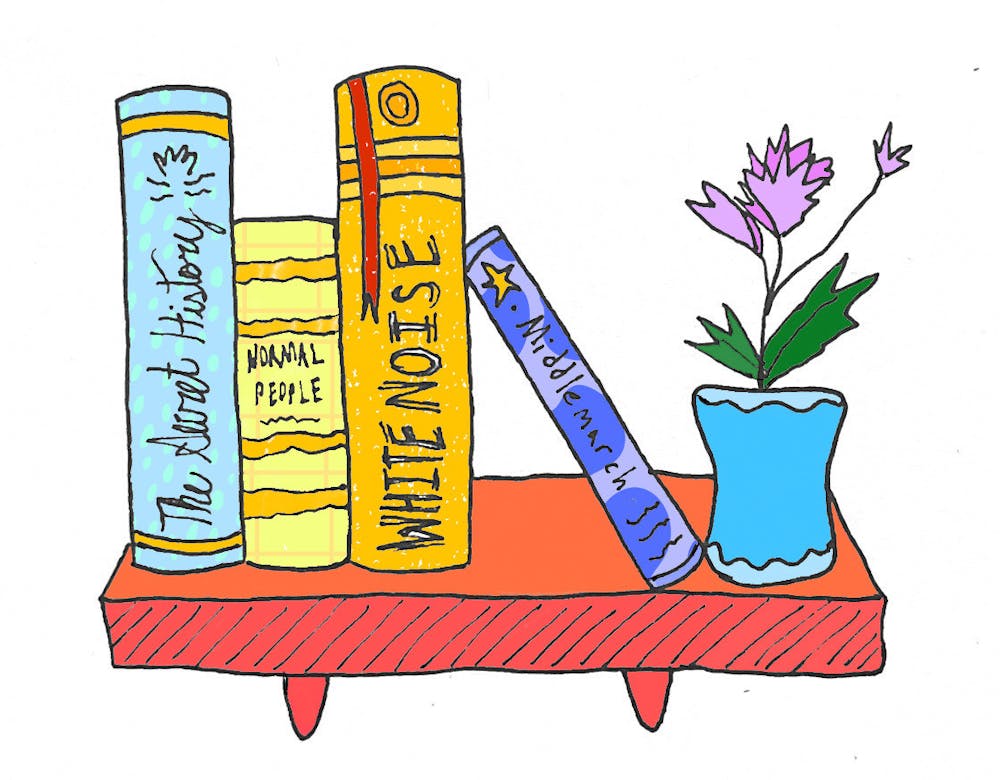As an English major, people often make small talk with me by asking about my favorite books. I vastly prefer this question to the alternative question about my degree: “So, what are you going to do with that?” Like most English majors, I read a lot, both for school and for pleasure. After I finish a semester, my reward is a trip to the bookstore where I can indulge in the books that I held off reading due to my coursework. To be clear, this is not a list of my favorite books. That list is unstable, shifting depending on the hour, the mood or the person asking. Instead, this is a list of books tailored to graduating seniors (though anyone could find some pleasure in them) — books that I hope will offer a balm or a new perspective as we prepare for the next phase of our lives.
“The Secret History”
This book is the closest thing Middlebury has to a founding text. Written by Donna Tartt, a graduate of the nearby Bennington College, “The Secret History” sets its inventive murder mystery in a small liberal arts college in rural New England which, except for a Bennington artsiness for which Middkids are just a little too square to match, bears a striking resemblance to Middlebury. It’s not just my opinion, though: Former Campus Editor in Chief Riley Board wrote an op-ed in 2021 explaining why “The Secret History” motivated her application to Middlebury. Regardless of the Middlebury connection, the novel offers readers the pleasures of dynamic characters, gorgeous prose and a propulsive plot.
“The Marriage Plot”
Jeffery Eugenides’ novel opens on a day sure to strike dread in the heart of any senior: graduation. The Kaia Gerber-approved book traces a love triangle among three recent graduates of Brown University, focusing on Madeleine, an English major trying to decide if there’s any place for the marriage plot in the reign of Derrida. If all of this sounds, well, too “English major,” don’t fear: At its heart “The Marriage Plot” is a classic coming-of-age story in which young people brought up in the humanities grapple with their entrance into the “real world.” Relatable, no?
“White Noise”
Don DeLillo belongs to the class of authors whose novels remain scarily prescient about their predicted futures (See also: Ling Ma’s “Severance” and Margaret Atwood’s “The Handmaid’s Tale”). I read “White Noise” last summer in the weeks following the Canadian wildfires that blanketed much of the Northeast in hazardous air. The novel follows a nuclear family that must flee their home after an “airborne toxic event” moves into the college town where they live. This book is frightening in its ability to strike at our complacency in the face of disaster. Though it was published almost forty years ago, “White Noise” continues to be one of the foremost novels to help me understand the world we will inherit.
“Middlemarch”
I’m a huge proponent of the infamously long novel. That being said, I’m of the opinion that most long novels don’t justify their length. “Middlemarch” remains an exception. Praised by Virginia Woolf as “one of the few English novels for grown-up people,” it has been an influence on some of our greatest writers for its psychological complexity and beautiful prose. What makes “Middlemarch” stand out among the pantheon of social novels (most of which I also adore) is its rigorous commitment to empathy. Even as we, humble readers, pick our heroes and villains, Eliot forces us to see the individual dignity in each character and the complex why that underpins their behavior. This is an invaluable lesson at any stage in our lives.
“White Teeth”
If you ever want to feel inadequate, here’s the reminder that Zadie Smith wrote her award-winning debut novel when she was 21 years old. Like many writers, she has come to (wrongly) regret her first novel, which also has the misfortune of being her best work. Since I was eighteen, I’ve read this book three times (once for pleasure and twice for class), and each time I’ve come away impressed again by its humor and intelligence. For a novel that is so many things — the urban novel, the multi-racial novel, the globalized novel — it is a forever recommendation of mine because it is also a novel that makes me cackle aloud while reading it in BiHall for the third time.
“The Right to Sex”
One of the most bracingly intelligent essay collections I’ve read, this is also a book that will draw attention to you if you read it in public. However, don’t let the potential for juvenilia put you off. Amia Srinivasan, an Oxford philosophy professor, is one of our foremost thinkers, and it’s just our luck she turned her gaze to interrogating sex as a serious academic subject. Srinivasan’s essays eschew easy answers, or definitive answers at all. Each essay made me less rather than more sure of what I knew before reading them, which is the benchmark by which I judge all worthwhile essay collections.
“The White Album”
“We tell ourselves stories to live,” begins Joan Didion’s towering essay collection. In the days following her death, this was the quote that appeared on inspirational Instagram tributes and tote bags alike. The appropriation of Didion’s quote, which is about the very instability of the stories we tell, almost proves its point. “Or at least we do for a while,” she continues. “I am talking here about a time when I began to doubt the premises of all the stories I had ever told myself.” In her opening, Didion chronicles her time in psychiatric care, as a result of a disorder she presents as being symptomatic of the unrest of the 1960s. We are of a generation uniquely tired of hearing about these “unprecedented times.” Reading Didion, and this book in particular, helps remind me that unprecedented times, and even calamitous times, are nothing new. If Didion can approach them with her cool intelligence, maybe we can too.
“Slow Days, Fast Company”
In most respects, Eve Babitz is the anti-Joan Didion: an effervescent stylist insistent on defending hedonism and California. The two women had a famously contentious friendship. However, Babitz is no slouch. She’s the rare party girl who works off a hangover by reading Virginia Woolf by the beach or churning out a short story. There are many very important, and maybe even necessary, essay collections I could recommend to help you better understand the way we live, but Babitz’s writing shows us how to savor life.
“Norwegian Wood”
With “Norwegian Wood,” Haruki Murakami set out to write something different from the magical realism that had made him popular in Japan. Ironically, this is the book that made him an international name. A deceptively simple story of college boy meets college girl meets bildungsroman, Murakami captures the lushness of the 1960s, nature (I can still taste the cherry blossoms in my mouth) and heedless young love with uncommon power. Be warned, it’s really sad.
“Normal People”
If you’re reading this, there’s a good chance you’ve already read Sally Rooney’s “Normal People.” It’s one of those books I’m embarrassed to admit affected me so much (I read this after my first breakup). Along with its intelligent commentaries on class and sex, it’s an enduring tribute to how people can change each other for the better even when they have left each other behind. At the time, I applied that truism to my high school boyfriend. Now, I apply it to the people I’ve been lucky enough to know and love here.

Sarah Miller '24 (she/her) is an Editor at Large.
She previously served as Opinions Editor and Staff Writer. Miller is an English major on the Creative Writing track. She hails from Philadelphia and spent the spring studying English at Trinity College Dublin. She has interned for The New England Review and hosts a WRMC radio show where you can still listen to her many opinions.




